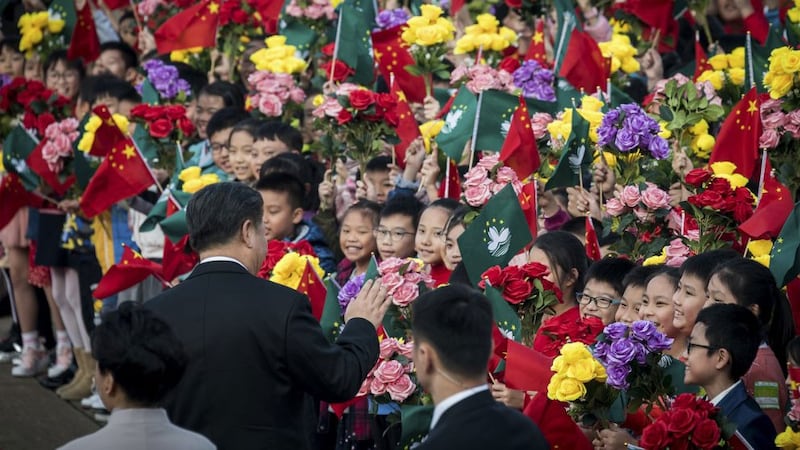The United Nations on Wednesday called on China to repeal a draconian national security law imposed on Hong Kong from July 1, 2020, citing a lack of protection for civil and political rights under a citywide crackdown on political opposition and public dissent.
In a report following its periodic review of China's compliance with international human rights covenants, the UN Human Rights Committee said it was "deeply concerned" that the national security law is being interpreted too broadly, citing a lack of clarity about the meaning of "national security."
"Since its enactment in 2020, the [law] has reportedly led to the arrests of over 200 people, including 12 children," the report said, adding that there is also provision under the law for people to be sent to China for investigation, prosecution, trial and to serve sentences.
The committee said China hasn't ratified the international covenants on civil and political rights, or economic rights, so the treaties wouldn't apply to such cases.
It called on the Hong Kong authorities to "take concrete steps to repeal the current National Security Law and, in the meantime, refrain from applying the Law."
The report added: "The excessive power of the Chief Executive and other measures provided for in the Law ... can effectively undermine the independence of judiciary and procedural safeguards for access to justice and right to a fair trial."
It also called for an independent national human rights institution with a comprehensive mandate and appropriate powers to promote and protect human rights.
The ruling Chinese Communist Party (CCP) defines "national security" broadly, and its laws at home and in Hong Kong criminalize overseas contacts and fundraising, criticism of the authorities and peaceful political opposition.
The law ushered in a crackdown on Hong Kong that has seen several senior journalists, pro-democracy media magnate Jimmy Lai and 47 former lawmakers and democracy activists charged with offenses from "collusion with a foreign power" to "subversion."
"National security education" -- a CCP-style propaganda drive targeting all age-groups from kindergarten to university -- is also mandatory under the law, while student unions and other civil society groups have disbanded, with some of their leaders arrested in recent months.
Civil society and elections
The U.N. report also highlighted "the excessive number of civil society organizations, such as trade unions and student unions, which have relocated or ceased to operate since the enactment of the [national security law]."
It called on the authorities to refrain from taking any action that could curb the freedom of association and to ensure that members of civil society will not be prosecuted under the law for taking part in the U.N. human rights review process.
And it highlighted recent changes to the electoral system that "give little or no chance for candidates of opposition parties to stand for election."
It called on the authorities to take "concrete steps, with a clear timeline, to introduce universal suffrage" and revise candidate eligibility guidelines to ensure diversity.
A Hong Kong government spokesman said the authorities rejected the report's findings.
"We are completely dismayed that the Committee continues to express unsubstantiated criticisms towards [Hong Kong] despite the delegation's efforts in addressing members' concerns and clarifying the misunderstandings of the human rights situation [here]," the spokesman said, before repeating much of the content of the government's original submission to the U.N. review.
"The National Security Law was enacted to restore the enjoyment of rights and freedoms which many people ... had been unable to enjoy during the period of serious violence between June 2019 and early 2020," he said in a reference to the 2019 protest movement, during which police were widely criticized internationally for excessive violence against protesters.

Jailed activist
The report came amid growing concerns for Hong Kong activist Tang Kai-yin, who is currently serving a three-year jail term for "organizing others to cross a border illegally" at Conghua Prison in the southern Chinese province of Guangdong, after he and a group of 11 others were intercepted while trying to flee to the democratic island of Taiwan after the 2019 protest movement.
His family rely on a government app showing Tang's money credits, merits and demerits, as well as letters home, for news of him. But the app hadn't been updated since May, and letters to him from family members have been returned undelivered, they said.
However, the app was updated soon after the situation was reported by local media, Tang's brother told RFA on Wednesday.
It showed that Tang had a number of demerits for violating "study discipline," including "not listening carefully or sitting in a designated seat."
He had earlier had a 10-point demerit for "fabricating or spreading attacks on or defaming current laws and policies," the app showed.
Tang's brother said the Hong Kong families of those serving jail time in mainland China are often unable to visit their loved ones due to the zero-COVID policy.
Recommendations for Macau
Meanwhile, authorities in Macau have banned several peaceful assemblies as illegal, with police using "recording devices" during other demonstrations.
The U.N. called on Macau to "ensure that any restrictions imposed on assemblies should comply with the strict requirements set out in [the international rights treaties]."
"The Committee noted with concern that recruitment agencies continue to charge migrant domestic workers excessive agency fees and that the Law on the Minimum Wage for Workers does not apply to non-resident domestic workers," the report said.
It called on the authorities to enhance protections for migrant workers, especially domestic helpers, by setting up an effective complaint mechanism to report "abuse and exploitation."
It highlighted similar complaints of racial discrimination in Hong Kong, calling on the authorities to enact comprehensive anti-discrimination laws banning unfair treatment on the grounds of race or ethnicity, age, sexual orientation and gender identity.
